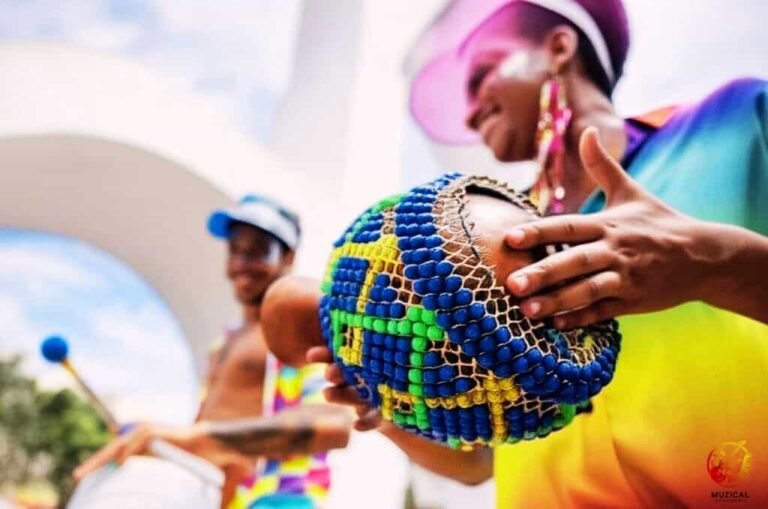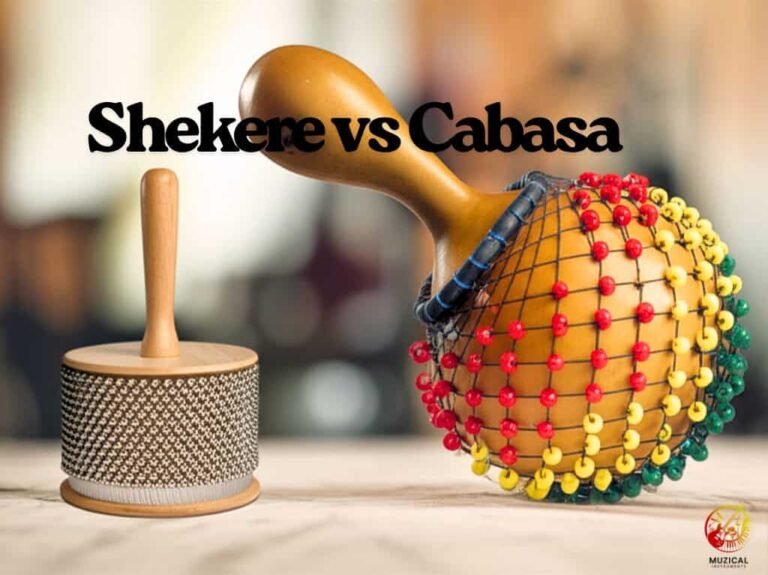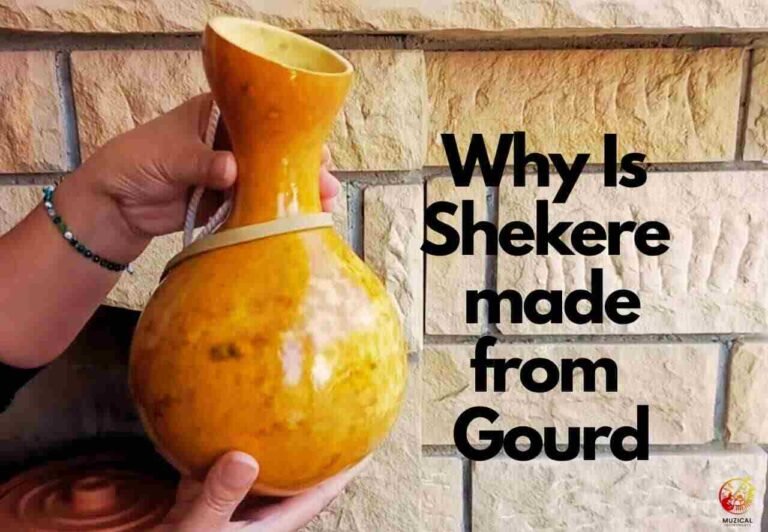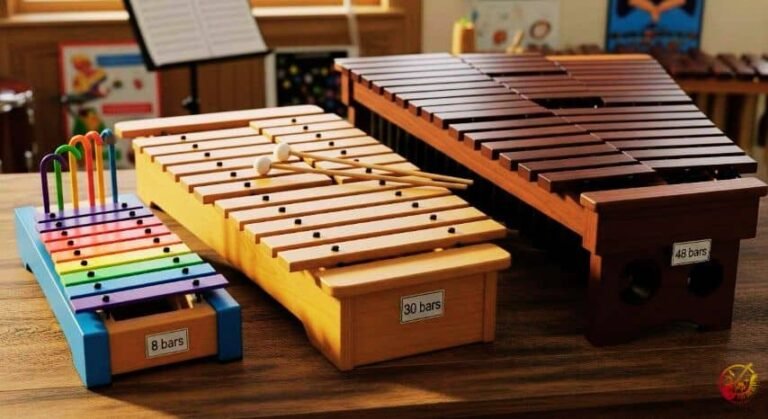The Spiritual Meaning of the Shekere: A Sacred Voice from Yorubaland
The Shekere is a small musical instrument but holds a big story. It may look like a gourd with beads, but the Shekere meaning is deep, bearing power, history, and spirit.
The gourd instrument comes from the Yoruba people in Yorubaland, a place in West Africa. It is made from a dry gourd, covered with a net of beads or shells. People shake it to make music. But it is more than music.
In the Yoruba religion, this percussion instrument used in rituals and ceremonies. It helps people talk to Orisha spirits and honor their ancestors. This is the spiritual meaning of Shekere, it is a way to send prayers, call blessings, and bring good energy.
This special instrument traveled far. In Cuba, it is called chekeré. In Brazil, it is xequerê. In Ghana, the Ewe people call it axatse. No matter the name, its spirit stays the same.
When you shake this African shaker, you shake a piece of the past, and it speaks back to you.
What Is the Shekere?
If you’re looking for a simple Shekere definition, it is a handmade music shaker. It starts as a vine gourd. This gourd is grown, picked, and left to dry. Then, it is cleaned and made smooth. A net of beads or shells is tied around it. That’s what gives it its sound.
You can shake it, tap it, or twist it. Each move makes a different sound. Some are loud. Some are soft. All of them carry a feeling.
It is not the same everywhere. In Cuba, people call it chekeré. In Brazil, it is called xequerê. In Ghana, it is called axatse, and the Ewe tribes play it in songs and stories.
Some are small. Some are big. Some are bright with colors. But all of them are made with care, by hand, and with love.
The gourd shaker is not just for fun. It helps people dance, pray, and feel strong. It’s a sound that speaks to the heart.
Where It All Began: Deep in Yorubaland
The Shekere comes from Yorubaland, a place in West Africa. It is the home of the Yoruba people, one of the largest groups in Africa. Yorubaland is mostly in Nigeria, but it also touches parts of Benin and Togo.
In Yorubaland, music is very important. It is used in everything: parties, ceremonies, and even when people pray. This traditional shaker is a big part of this. It is used to call on Orisha spirits, who are powerful beings that guide the people. It is also played to honor the ancestors, those who came before.
The people of Yorubaland believe that sound has power. A simple beat can change the world around you. It can bring peace, strength, and joy. So, when they play this gourd instrument, they are connecting with their history and their spirits.
Music and rhythm are the heartbeat of Yoruba culture. The gourd shaker is one of the strongest ways they keep this heartbeat alive.
Why the Shekere Is Spiritually Powerful
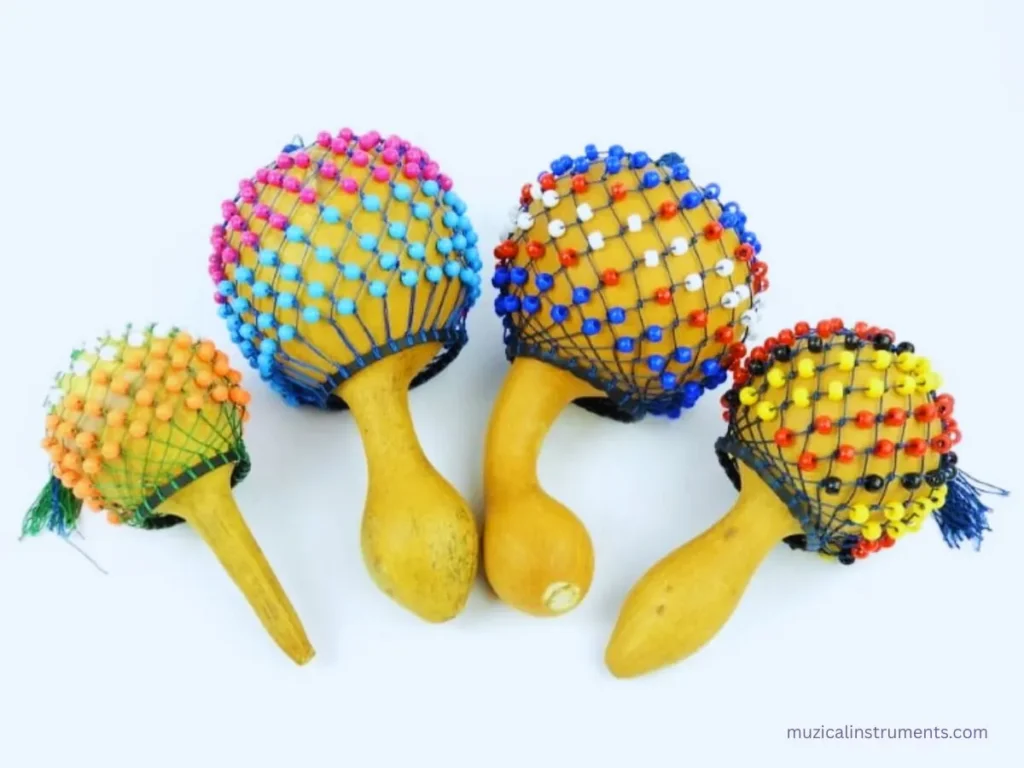
The Shekere spiritual meaning is profound, as it’s not just an instrument but a vessel full of spiritual significance. Every part of it has a deep connection to the Yoruba religion and to the people who make it.
First, the gourd is very special. In many cultures, a gourd is seen as a symbol of life. It starts as a small seed and grows into something strong and full of energy. When you hold the this percussion piece, you are holding a piece of that life.
Next, the beads or shells on the instrument are important. They are more than just decoration. In Yoruba culture, they represent the community. Each bead or shell can remind you of a person, a story, or an idea. When you shake it, it makes a sound, and each sound is like a prayer that carries the spirit of the community with it.
When the it is used in rituals or ceremonies, it calls out to the Orisha spirits. These spirits are believed to guide the people, giving them wisdom, love, and protection. It also helps connect the physical world with the spirit world. It is used to send prayers and to receive blessings.
The sound of the instrument is seen as sacred. In Yoruba religion, it is believed that every beat carries energy, and that energy can help bring balance, peace, and strength. The sacred shaker isn’t just about noise, it’s about spirit.
Crossing Oceans: The Shekere in the Diaspora
The Shekere didn’t stay in Yorubaland. It traveled far across the ocean to places like Cuba, Brazil, and even Ghana.
When African people were taken as slaves, they brought their music and their culture with them. This African instrument went with them, keeping its spiritual power alive. In Cuba, people call it chekeré. It is used in Santería, a religion that blends African beliefs with Catholicism. In Brazil, it is called xequerê, and it is used in Candomblé ceremonies, where people honor spirits just like in Yorubaland. In Ghana, the Ewe people play a similar instrument called the axatse.
Even though the Shekere changed names, its meaning stayed the same. It was a way to stay connected to the past, to the Orisha spirits, and to ancestors. It kept the rhythm of Africa alive, no matter where people went.
This gourd instrument reminds us that no matter where we are, we carry our culture and our spirits with us.
Let’s look at how the Shekere changes across countries, but still keeps its heart and spirit the same:
Shekere Around the World
| Country | Local Name | Religion/Culture | Role/Use |
|---|---|---|---|
| Nigeria | Shekere | Yoruba Religion | Rituals, prayer, calling Orisha |
| Cuba | Chekeré | Santería | Worship, spirit connection |
| Brazil | Xequerê | Candomblé | Ceremonies, ancestral honor |
| Ghana | Axatse | Ewe Culture | Music, stories, healing songs |
How People Use the Shekere Today
Today, the Shekere is still played all around the world. People use it in music, dance, school, and worship. It brings joy, rhythm, and spirit wherever it goes.
In some places, musicians play the instrumentin bands and drum circles. In others, it is part of church or temple music. It is also used in schools, where kids learn about different cultures and sounds.
Many people still use the gourd shaker in spiritual ways. They play it during prayer, meditation, and healing. Some believe the sound can clean bad energy and bring peace.
You can also find Shekeres made in new ways. Some are small, some are big. Some have bright colors, and some are made from plastic. But it’s heart always stays the same.
No matter where you are, when you shake this traditional instrument, you are part of something old, true, and full of life.
What the Shekere Means for You
The Shekere is more than a shaker. It is a teacher, a guide, and a friend. It reminds you to slow down. To listen. To feel.
When you shake this instrument, you’re not just making music. You’re sending out your heart. You’re calling peace. You’re honoring your past.
It doesn’t matter where you come from. It welcomes everyone. It helps you feel grounded. It helps you feel joy. It helps you feel strong.
The spiritual meaning of Shekere is this: you are never alone. You are part of something big. Something deep. Something full of love and light.
So hold it in your hands. Feel its weight. Shake it once. Let it speak to you. And maybe just maybe it says exactly what you need to hear.
FAQ
What is a Shekere?
It is a musical instrument from Africa. It’s made from a dried gourd with beads or shells woven around it. When you shake it, it makes a fun, rattling sound.
Where did the Shekere come from?
The Shekere started in West Africa, especially with the Yoruba people in Nigeria. It’s also found in places like Ghana and Togo.
How do you play the Shekere?
You can shake it, tap it, or twist it. Each way makes a different sound. It’s fun to try all the ways!
Is the Shekere used in other countries?
Yes! In Cuba, it’s called “Chekeré.” In Brazil, it’s known as “Xequerê.” People in many countries love playing it.
Can I make my own Shekere?
Yes, you can! You’ll need a dried gourd, some beads or shells, and string. It’s a fun craft to do with friends or family.
Is the Shekere used in special ceremonies?
Yes. In many African cultures, it is played during dances, songs, and important events to bring joy and connect with traditions.
What makes the Shekere special?
The Shekere is more than just an instrument. It’s a piece of culture, history, and art. Playing it connects us to stories and people from long ago.
Final Thoughts: Your Turn to Shake the Spirit
The Shekere is small, but its meaning is big. It comes from the heart of Africa, from the hands of the Yoruba people, and from the soul of spirit and sound.
It has crossed oceans. It has healed hearts. It has told stories. And now, it has found you.
When you hear the Shekere, you hear more than music. You hear history, hope, and healing. You hear a voice that reaches across time.
Whether you play it, hold it, or just liste, the Shekere is ready to share its spirit with you.
Discover the rich history of the Middle Eastern hand drum known as the Darbuka.

